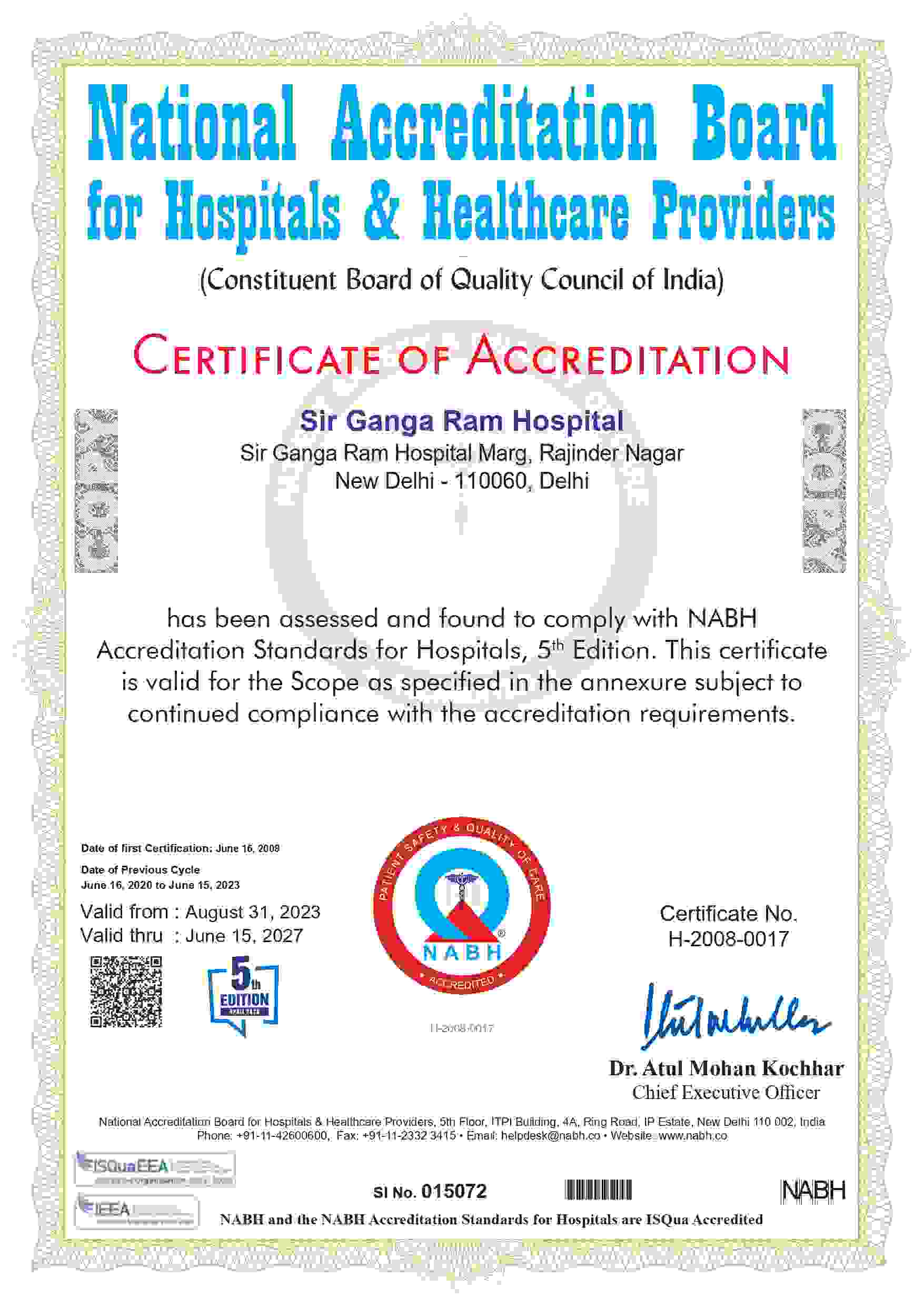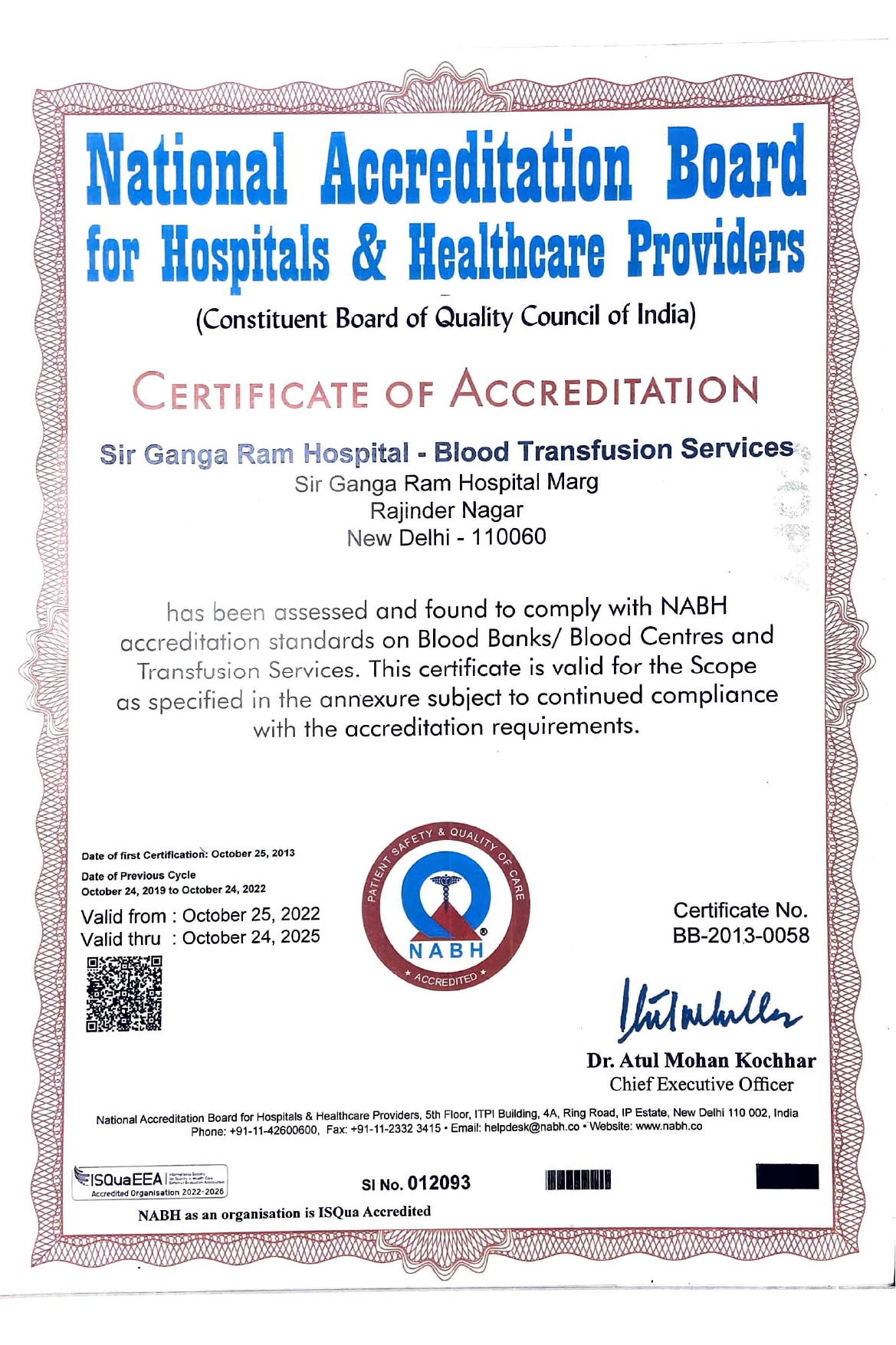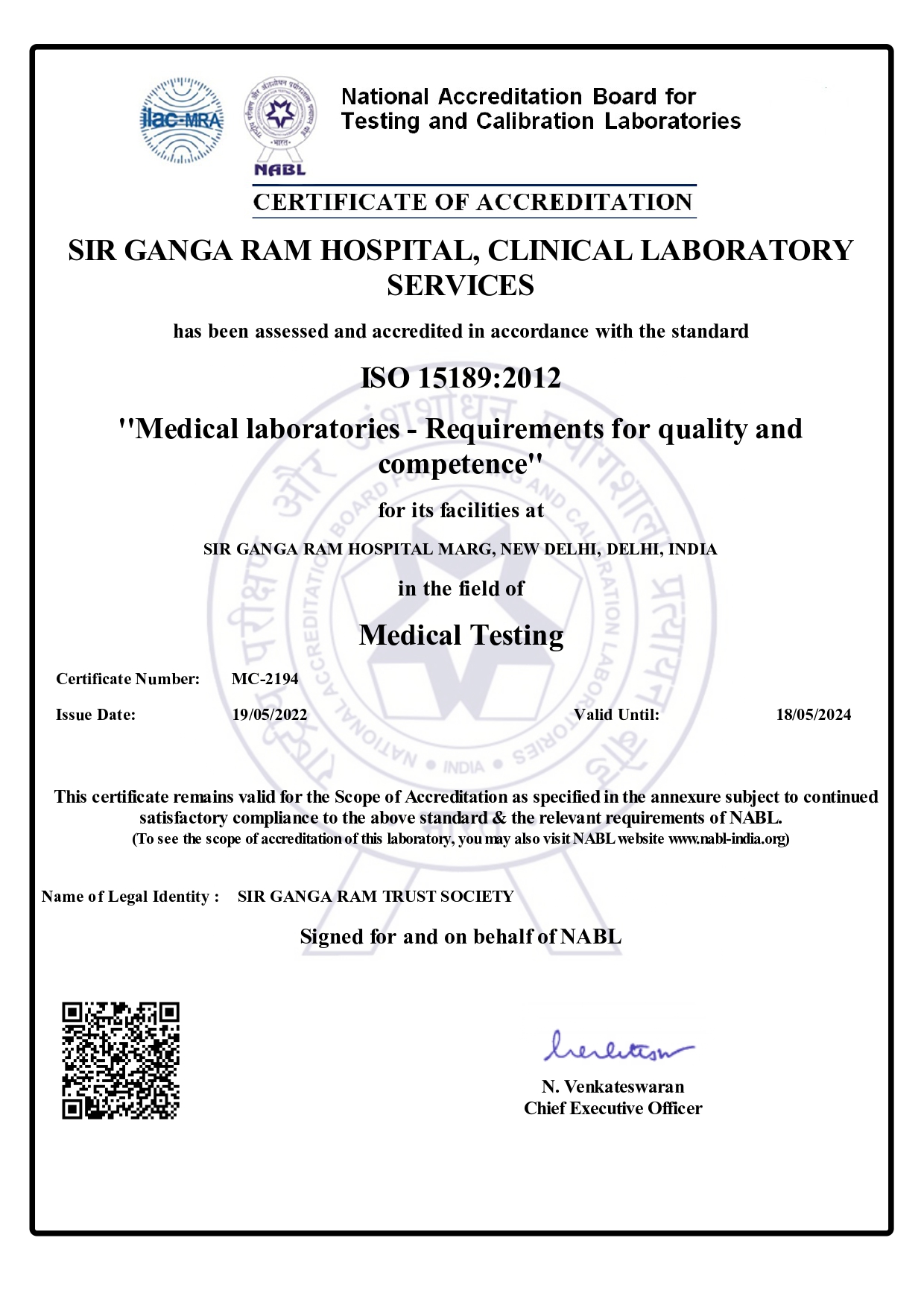At Sir Ganga Ram Hospital, we are proud to uphold a steadfast commitment to providing the highest quality healthcare services to our patients. Our pursuit of excellence is not only reflected in the expertise of our medical professionals but also in our unwavering dedication to meeting and exceeding standards of quality and accreditation
With a legacy spanning over decades, the hospital has consistently prioritized patient well-being and clinical excellence. As a testament to its commitment to delivering the highest quality care, Sir Ganga Ram Hospital has achieved the prestigious accreditation from the National Accreditation Board for Hospitals & Healthcare Providers (NABH).
Under the NABH framework, Sir Ganga Ram Hospital has implemented robust systems and protocols to ensure patient-centric care and safety. The hospital follows evidence-based clinical practices and implements standardized treatment protocols, promoting optimal clinical outcomes. Continuous monitoring, evaluation, and improvement mechanisms are in place to maintain and enhance the quality of care provided.
Patient safety is a top priority at Sir Ganga Ram Hospital. Stringent infection control measures, including proper sterilization techniques, adherence to hand hygiene practices, and effective waste management systems, are diligently implemented. The hospital maintains a safe and secure environment for patients, minimizing the risk of healthcare-associated infections and ensuring the well-being of every individual who seeks their services.
By attaining NABH accreditation, Sir Ganga Ram Hospital has also demonstrated its commitment to ethical practices and patient rights. The hospital upholds a strong code of conduct, ensuring transparency, confidentiality, and respect for patient privacy. It places great emphasis on informed consent and effective communication, empowering patients to actively participate in their treatment journey.
The National Accreditation Board for Hospitals & Healthcare Providers (NABH) is a prestigious accreditation body in India that sets rigorous standards for healthcare organizations. NABH accreditation serves as a testament to the commitment of healthcare providers towards delivering high-quality care and patient safety.
Achieving NABH accreditation signifies that an organization has met stringent benchmarks and demonstrated adherence to best practices in healthcare. It assures patients and stakeholders that the accredited facility follows international protocols, maintains stringent infection control measures, upholds ethical practices, and continuously strives for excellence.
NABH accreditation is a mark of excellence that signifies a healthcare organization's commitment to providing quality care, patient safety, and continuous improvement
Quality Assurance: NABH accreditation ensures that the accredited healthcare facility has robust quality assurance systems in place, including patient-centric processes, evidence-based clinical practices, and continuous monitoring and improvement mechanisms.
Patient Safety: NABH-accredited organizations prioritize patient safety through standardized protocols, effective risk management, and stringent infection control measures. This ensures that patients receive care in a safe and secure environment.
Improved Outcomes: By adhering to NABH standards, healthcare providers focus on delivering evidence-based care and implementing standardized treatment protocols. This leads to improved clinical outcomes and patient satisfaction.
Enhanced Organizational Efficiency: NABH accreditation promotes streamlined processes, efficient resource utilization, and effective documentation practices. This leads to improved operational efficiency and overall organizational effectiveness.
Professional Development: Accredited organizations foster a culture of continuous learning and professional development among their staff. This results in a highly skilled workforce that stays updated with the latest advancements in healthcare.

Sir Ganga Ram Hospital's Blood Bank has successfully achieved NABH (National Accreditation Board for Hospitals & Healthcare Providers) accreditation, highlighting its commitment to maintaining the highest standards of quality, safety, and excellence in blood transfusion services. This accreditation recognizes the hospital's blood bank as a trusted and reliable provider of blood and blood products, ensuring the well-being and safety of patients in need.
NABH accreditation for a blood bank is a prestigious recognition awarded to healthcare organizations that meet stringent quality standards set by the National Accreditation Board for Hospitals & Healthcare Providers. This accreditation signifies the commitment of the blood bank towards ensuring the highest level of quality, safety, and reliability in blood transfusion services.
Key Elements of NABH Blood Bank Accreditation:
1. Quality Management Systems:
Implementation of robust quality management systems to ensure adherence to established protocols, guidelines, and best practices in blood banking. Regular monitoring, evaluation, and improvement of processes to enhance the overall quality of blood transfusion services. Infrastructure and Facility Requirements:
Adequate infrastructure and well-equipped facilities to support safe and efficient blood collection, testing, processing, storage, and distribution. Compliance with stringent guidelines for environmental control, blood storage conditions, equipment maintenance, and emergency management.Qualified and Competent Staff:
Presence of qualified and trained staff members with appropriate expertise in blood banking, including technicians, pathologists, and other healthcare professionals.
Continual training and skill development programs to ensure staff competency and proficiency in handling blood products and maintaining high safety standards.
2. Donor Screening and Testing:
Implementation of strict donor screening protocols to ensure the selection of eligible and safe blood donors.Comprehensive testing procedures for donated blood to detect infectious diseases, including HIV, hepatitis B and C, syphilis, and others, ensuring the safety of transfusion recipients.
3. Blood Component Preparation and Storage:
Adherence to established guidelines for the preparation, labeling, and storage of various blood components, such as packed red blood cells, platelets, and plasma. Proper inventory management practices to minimize the risk of inventory shortages or expiry of blood components.
4. Transfusion Safety:
Implementation of robust processes to ensure accurate and safe blood matching, cross-matching, and administration to patients. Adherence to protocols for verifying patient identity, compatibility checking, and documentation of transfusion-related information. Benefits of NABH Blood Bank Accreditation:
Enhanced patient safety through strict adherence to quality and safety standards.Increased confidence and trust among patients, healthcare providers, and regulatory bodies. Improved operational efficiency and better management of blood bank processes. Access to the latest best practices, guidelines, and quality improvement initiatives. Recognition as a center of excellence in blood transfusion services.
NABH Blood Bank Accreditation is a testament to the commitment of a blood bank at Sir Ganga Ram Hospital towards ensuring the highest standards of quality, safety, and reliability in blood transfusion services. This accreditation promotes patient safety, enhances confidence among stakeholders, and establishes the blood bank as a center of excellence in the field. By adhering to NABH standards, SGRH blood bank esnures maintaining the integrity of the blood supply chain and ensuring the well-being of patients who rely on safe blood transfusions.

Sir Ganga Ram Hospital has achieved NABL (National Accreditation Board for Testing and Calibration Laboratories) accreditation, reinforcing its commitment to delivering accurate, reliable, and high-quality testing and calibration services. This accreditation demonstrates the hospital's adherence to internationally recognized standards, ensuring the competence and integrity of its laboratory operations.
NABL (National Accreditation Board for Testing and Calibration Laboratories) accreditation is a prestigious recognition bestowed upon laboratories in India that demonstrate technical competence and adherence to internationally accepted standards. This accreditation plays a vital role in ensuring the quality, reliability, and accuracy of testing and calibration services provided by laboratories across various sectors.
Key Elements of NABL Accreditation:
1. Stringent Quality Standards:
NABL accreditation requires laboratories to comply with stringent quality standards, such as ISO/IEC 17025:2017, which outlines general requirements for the competence of testing and calibration laboratories. Compliance with these standards ensures that laboratories follow robust quality management systems, maintain accurate documentation, and perform testing and calibration activities with precision and reliability.
2. Competent Staff:
NABL-accredited laboratories are staffed by qualified professionals with expertise in their respective fields. The accreditation process evaluates the technical competence of laboratory personnel, including their qualifications, training, and experience, to ensure the delivery of accurate and reliable test results.
3. Calibration and Testing Techniques:
Accredited laboratories employ advanced calibration and testing techniques, using state-of-the-art equipment and instruments. These techniques are validated and verified to ensure accurate and precise measurement, analysis, and calibration of various parameters and substances.
4. Quality Control and Assurance:
Accredited laboratories have robust quality control and quality assurance systems in place to monitor and validate the accuracy and reliability of their testing and calibration processes. Regular participation in proficiency testing programs and internal quality audits helps ensure the ongoing maintenance of high-quality standards.
5. Traceability of Measurements:
NABL accreditation emphasizes the traceability of measurements to national and international measurement standards. Accredited laboratories establish and maintain traceability through the use of calibrated reference materials, validated methods, and adherence to recognized measurement practices.
NABL accreditation serves as a mark of credibility, signifying that a laboratory operates at a high level of competence, integrity, and reliability. The accreditation instills confidence in customers, regulatory authorities, and other stakeholders regarding the accuracy and reliability of test results. NABL accreditation is recognized globally as a symbol of competence and quality.Accredited laboratories can participate in international proficiency testing programs, collaborate with international partners, and gain wider acceptance for their test reports and calibration certificates. NABL accreditation ensures compliance with national and international regulatory requirements and standards. This accreditation helps laboratories meet the criteria set by regulatory bodies, industry-specific guidelines, and customer expectations. Accreditation drives laboratories towards continuous improvement in their processes, systems, and technical capabilities. Through periodic assessments, external audits, and corrective action plans, accredited laboratories maintain and enhance their quality standards.
Sir Ganga Ram Hospital stands as a beacon of excellence in the healthcare industry, exemplifying its commitment to the highest quality standards and providing the best possible care to patients seeking treatment. The hospital's prestigious accreditations, such as NABH for its blood bank and NABL for its testing and calibration laboratories, serve as testaments to its unwavering dedication to quality, safety, and patient satisfaction.
